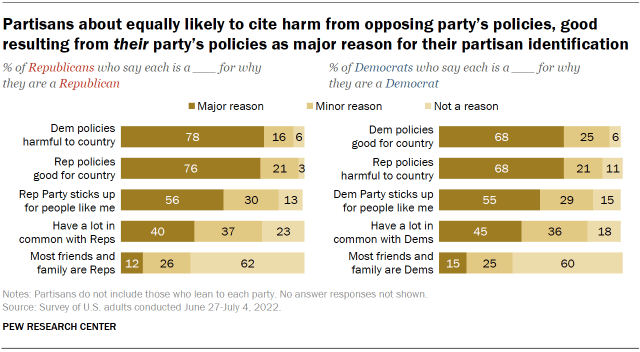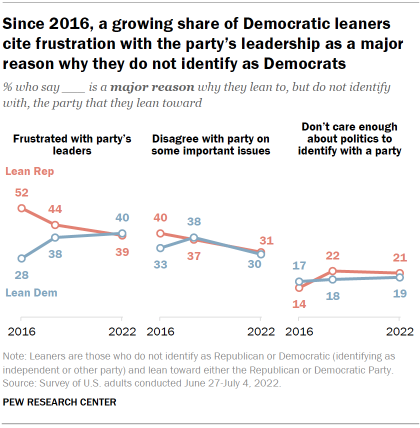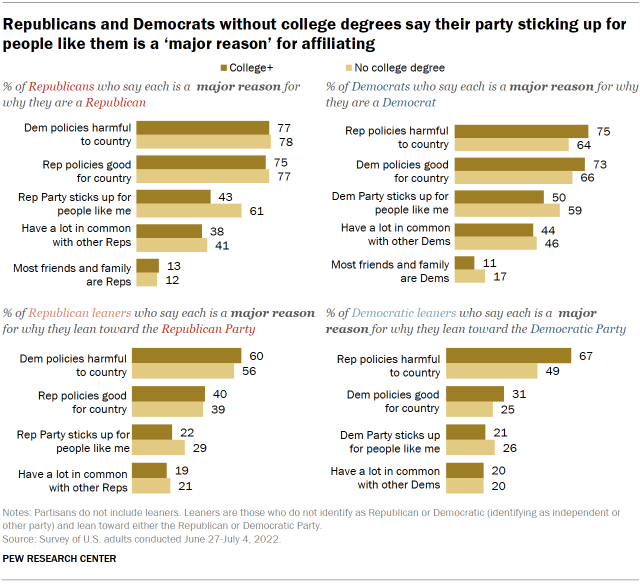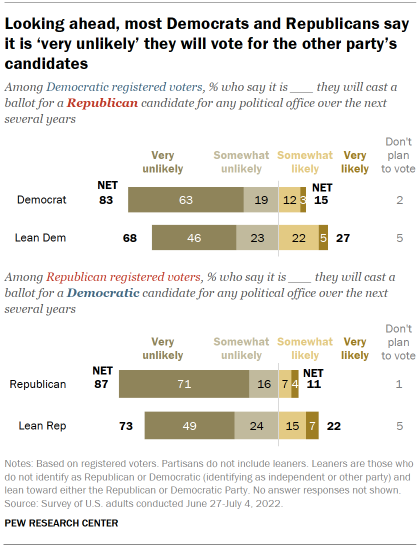Republicans and Democrats are as likely to point to the harm of the other party’s policies as a major reason for affiliating with their party as they are to point to the good of their party’s policies.
Those who don’t identify as a partisan, but lean toward one of the parties, are most likely point to the negative impacts they see coming from the other party’s agenda as a major reason for why they lean toward that party.
About eight-in-ten Republicans (78%) and seven-in-ten Democrats (68%) say that the harm of the other party’s policies to the country is a major reason they identify with their own party. The shares citing these negative factors for their partisan affiliation have increased since Pew Research Center’s 2016 study of partisanship. At that time, 68% of Republicans and 62% of Democrats cited the harm to the country by the other party’s policies as a major reason for their decision to identify with their party.
About three-quarters of Republicans (76%) and 68% of Democrats say their own party’s policies being good for the country is a major reason they affiliate with their party.

Just over half of Republicans (56%) and Democrats (55%) say that their party sticking up for people like them leads them to adopt the party label. Around four-in-ten in each party (40% of Republicans, 45% of Democrats) say having a lot in common with people who are members of their party is a major reason for their affiliation.
Few in either party point to most of their friends and family being of the same party as a major contributor to their partisan identity: Just 12% of Republicans and 15% of Democrats say this is a major reason.
Why partisan leaners lean – and why they don’t identify with a party
Those who lean toward one of the two major parties but do not identify as partisans most commonly cite harm to the country from the other party’s policies as a reason for why they choose to lean as they do.

Majorities of Republican leaners (57%) and Democratic leaners (55%) say the other party’s policies being harmful to the country is a major reason why they lean toward their party. Nearly four-in-ten Republican leaners (39%) and about a quarter of Democratic leaners (27%) say the policies of the party they lean toward being good for the country is a major reason they lean in that direction.
About a quarter of both GOP leaners (27%) and Democratic leaners (24%) say the party sticking up for people like them is a major reason for their leaning. About two-in-ten say having a lot in common with party members is a major reason (21% of Republican leaners and 20% of Democratic leaners).
Asked why they lean toward a party but do not identify with it, about four-in-ten leaners say a major reason is that they do not like putting labels on their political views (45% of Republican leaners and 43% of Democratic leaners). Nearly as many cite frustration with the party’s leaders as a major reason keeping them from embracing the party more (39% of Republican leaners, 40% of Democratic leaners).
About three-in-ten leaners (31% of Republican leaners and 30% of Democratic leaners) say disagreeing with the party on important issues is a major reason why they don’t embrace the party label, while about two-in-ten cite not caring enough about politics to identify with a party as a major reason (21% and 19%, respectively).

Since 2016, the share of Democratic leaners who say frustration with party leadership is a major reason they don’t identify with the Democratic Party has increased. At the same time, the share of Republican leaners who cite frustration with GOP leaders as a major reason for not identifying as Republicans has declined.
As a result, today there is essentially no difference in the shares of Republican (39%) and Democratic leaners (40%) who say frustration with party leaders is a major reason they don’t identify with the party. Six years ago, there was a 24 percentage point gap between Republican and Democratic leaners (52% of Republican leaners vs. 28% of Democratic leaners) on this question.
The share of Republican leaners citing disagreement with GOP policies as a major reason for not identifying as a partisan has declined over the last several years: Today, 31% say this is a major reason, while 37% said this in 2018 and 40% said this in 2016. Democratic leaners are also less likely to cite this as a major reason for not identifying as a Democrat than they were four years ago (30% now, 38% then), though the share saying this today is little different than it was in 2016 (when 33% said this).
Non-college adults are more likely than college graduates to cite the party ‘sticking up for people like them’ as a major reason for identifying with it
Partisans without four-year college degrees are more likely than those with degrees to say a major reason for affiliating with their party is because it “sticks up for people like me” – and this is especially the case among Republicans.

A 61% majority of Republicans who do not have bachelor’s degrees say the party sticking up for them is a major reason for their party identification; 43% of Republicans with more education say the same. There is a narrower but still significant gap among Democrats: 59% without college degrees say the Democratic Party sticking up for people like them is a major reason for identifying as a Democrat. By comparison, 50% of Democrats with bachelor’s degrees or more education say this.
Republican leaners without bachelor’s degrees (29%) also are more likely than those with a bachelor’s or more education (22%) to cite the GOP standing up for them as a major reason for their leaning.
Democrats and Democratic leaners with four-year degrees are more likely than those without degrees to say policies play a major role in their political affiliation – especially in negative views of Republican policies. Two-thirds or more of Democrats (75%) and Democratic leaners (67%) with college degrees say negative views of Republican policies are a major reason they identify with or lean toward the Democratic Party. Democrats and Democratic leaners without college degrees are less likely to say this (64% of Democrats and 49% of Democratic leaners without four-year degrees).
Few voters say it is likely they will vote for the other party

Most registered voters – regardless of whether they identify with a party or are independents who lean toward a party – say it is unlikely they will cast a ballot for a candidate from the other party for any office over the next several years.
About eight-in-ten or more Democrats (83%) and Republicans (87%) say it is at least somewhat unlikely they will cast a ballot for a candidate from the other party, including 63% of Democrats and 71% of Republicans who say it is very unlikely.
Most voters who lean toward a party also say they’re unlikely to cast ballots for the other party’s candidates for any political offices. About seven-in-ten of those who lean toward the Democratic Party (68%) or the Republican Party (73%) say it is somewhat or very unlikely they would vote for the other side. About half of these voters say it is very unlikely they would do this (46% of Democratic leaners and 49% of GOP leaners).
However, leaners are somewhat more likely than those who identify with the parties to say it is somewhat or very likely they would swing to vote for the other party: 27% of Democratic leaners and 22% of Republican leaners say it is somewhat or very likely they will vote for the other party’s candidates in the next several years, compared with just 15% of Democrats and 11% of Republicans.



